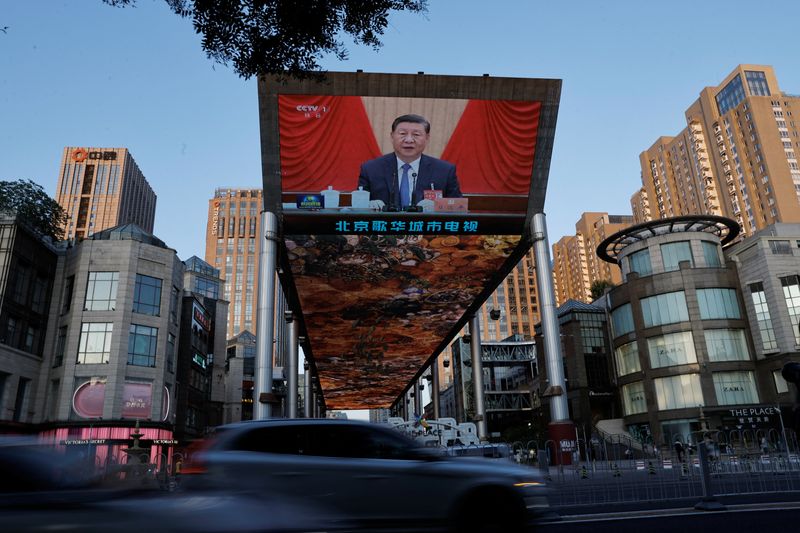BEIJING (Reuters) -Chinese leaders signalled on Tuesday that the stimulus measures needed to reach this year’s economic growth target will be directed at consumers, deviating from their usual playbook of pouring funds into infrastructure projects.
The world’s second-largest economy missed growth forecasts in the second quarter and faces deflationary pressures, with retail sales and imports significantly underperforming industrial output and exports.
The Politburo, a top decision-making body of the ruling Communist Party, pledged at the end of its July meeting to make “countercyclical adjustments” during the rest of 2024 to meet an economic growth goal of roughly 5% for the year.
“The meeting stressed that it is necessary to focus on boosting consumption to expand domestic demand,” the official news agency Xinhua said.
The Politburo said policies should increase residents’ income “through multiple channels” and enhance the “ability and willingness” of low- and middle-income groups to spend.
It called for measures to improve welfare for the elderly and children, and “weave a dense and solid social security net”.
As expected, no specific steps were announced, but the leadership pledged to “timely launch a batch of incremental policy measures”.
In referencing incomes and social welfare, it nodded to measures advocated by some economists who have long argued that China’s economic model relies too heavily on investment and has produced much more debt than growth in the past 15 years.
They propose Beijing transfers resources from the government sector to households to address this imbalance, which they say could lead China towards a decades-long period of low growth and periodic deflation as seen in Japan.
Analysts said the latest Politburo readout contained more references to household consumption than previous ones, but this did not necessarily point to a new top-level agenda for a structural shift to rebalance the economy.
The meeting’s summary still gave prominent space to pursuing “new productive forces”, a term coined by President Xi Jinping last year that envisions scientific research and technological upgrades for the world’s largest industrial complex.
This suggest Beijing is holding onto its supply-side priorities, analysts said.
“The meeting did call for policymaking to focus more on household welfare,” Julian Evans-Pritchard, head of China economics at Capital Economics. “This sounds promising on paper.”
“But the lack of any specifics means it is unclear what it will entail in practice. And overall, the communique suggests the primary focus of policy remains on economic security and nurturing new productive forces in high-end sectors.”
Beijing uses the July politburo meeting to recalibrate economic policies for the rest of the year, not as a forum that discusses longer-term goals. A different Party meeting on July 15-18, which takes place roughly twice a decade, pointed to policy continuity, rather than structural shifts.
The yuan, and Chinese stocks and bonds were little changed following the announcement.
WEAK DEMAND
After unshackling the economy from three years of COVID-19 restrictions, Chinese officials had hoped that stimulating the industrial sector would stabilise the job market and lead to higher wages and consumption.
What happened instead was that greater industrial capacity led to price wars and a cost-cutting race that kept wages depressed, fuelling job uncertainty and adding to the pain among consumers caused by the property sector downturn.
“The government recognises that domestic demand is weak,” said Zhiwei Zhang, chief economist at Pinpoint Asset Management.
Authorities have already signalled in recent weeks a shift to a more supportive policy stance.

China’s central bank surprised markets by cutting major interest rates last week, while the state planner said some funds raised through this year’s ultra-long bond issuance would be shifted towards supporting a consumer goods trade-in scheme.
On the crisis-hit property sector, the Politburo reiterated existing policy goals, saying China will continue to support the delivery of unfinished projects and turn unsold apartments into affordable housing. It also reaffirmed plans for a “proactive” fiscal policy, and “prudent” monetary framework.
To read the full article, Click Here

